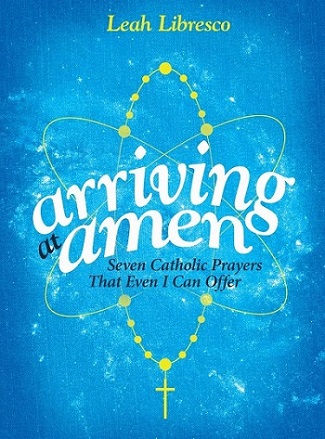 Arriving At Amen by Leah Libresco
Arriving At Amen by Leah Libresco Publisher: Ave Maria Press (2015)
eARC (192 pages)
Via: NetGalley
Rating:
Reading Challenges: Read 2015
Synopsis
A former atheist makes sense of Catholicism and learns to pray by relying on the rosary and the rumba, avoiding sin and the sunk cost fallacy, and finding communion along Cartesian coordinates.
Find the book: Goodreads
My Review
There are seven chapters in this book, each chapter dealing with a different type of prayer. As I was writing this review, I realized that it became a review and reflection all in one. I hope you all don’t mind.
Chapter 1 is “Petition.” Leah Libresco begins this chapter noting that “petition may be the most common type of prayer.” In prayers of petition we ask God for the things we need. Prayers of petition help us to pray for others which in turn brings our attention to God Himself.
On the topic of petitionary prayer, Leah brings up something that I think we all think of at some point. “Even if I conceded the existence of an omnipotent, omniscient, and omnibenevolent being, that second ‘omni’ seemed enough to guarantee that the whole project was futile.” In other words, if God knows everything, He would know what we need and want before we even ask. The thing is that God does know what we need and want. By offering petitionary prayer, we are letting God know what is bothering us and at the same time it reminds us that God is with us through everything.
The second chapter is called “Confession.” Confession is the beautiful sacrament where we tell Jesus (in the person of the priest) our sins and ask for His forgiveness. God is always ready to forgive us if only we ask. Leah shares her own thoughts on Confession saying, “Soon after my conversion, once Confession became something I did not just something I theorized about, I was surprised to find that it was my favorite sacrament.” Confession is one of those hard things to talk about. It is a very private sacrament happening between an individual and a priest acting in persona Christi. For me, the sacrament really helps me to be honest about my faults and helps give me a means to change.
Chapter 3 is entitled “Examen” wherein Leah talks about the five part Ignatian Examen. “The first step of the Examen is reviewing the past day, looking for moments of joy and expressing gratitude to God.” This part can be a bit difficult if we are not attuned to remembering the specifics of our day. “Next comes praying to God for light and clear vision to aid in reflection and judgment.” We ask God to help us see clearly the events of our day. “Only then does the Examen get to the review of errors and sins that looks more like a standard examination of conscience.” This practice helps us see a pattern in our faults and failings that are not always present when doing an examination of conscience before Confession. “The fourth step is asking for forgiveness, and the final step is asking for guidance and help in doing better the next day.” The whole point of the Examen as I see it is to cultivate a spirit of attentiveness to our actions as we try to do better every day.
The fourth chapter is titled “Rosary.” The Rosary is one of my favorite prayers ever. Leah says, “The Rosary is a storytelling prayer. It moves along the arc of Jesus and Mary’s experience and offers many points of access into their lives.” I think that may be why I like the Rosary so much. I feel it helps me grow closer to Jesus and Mary each time I meditate upon their lives.
Chapter 5 is “Divine Office.” The Divine Office is also known as the Liturgy of the Hours. “The Liturgy of the Hours, which predates many of the splits and schisms in the Body of Christ, is a cycle of psalms and prayers,” Leah explains. I love the Liturgy of the Hours for it speaks to me everyday. The psalms cover so much of human experience and the Liturgy of the Hours imitates that through the use of the psalms and prayers inspired by them.
The sixth chapter is “Lectio Divina.” Lectio divina is the prayerful reading of the Scriptures. “Classically, the four stages of lectio divina are lectio, meditatio, oratio, and contemplatio (read, meditate, pray, and contemplate).” My lectio divina typically involves my journal as I find my focus is better when I write.
Chapter 7 is “Mass.” I rather like Leah’s short description of the Mass: “The readings from the Old and New Testaments shows us how to to live, and the crowning moment of the Mass, the Eucharist, is our lesson in why we want to live in union with God.”
Overall, I loved this book. It was a great reminder why I love being Catholic. I think this book could be for anyone, Catholics looking to grow in their faith and for those interesting in Catholicism.
Catholic Connections
The entire book is a Catholic connection.
Which Reading Challenges?
- You Read How Many Books? Reading Challenge

I received this book for free from the publisher via NetGalley for review consideration. This in no way affects my opinion of the title nor the content of this review.







This was an interesting read. As a Protestant, I feel that I miss out on some of the more structured things (for lack of a better word) that the Catholic church has. I enjoy learning about Catholicism.
I’ve never thought of confession as a priest acting in persona Christ. That’s very interesting. I think confessing to a human being, especially someone acting in persona Christi, makes it a little more real, if that makes sense. I think it would encourage me to not do those same sins again (at least for a while). But I would also find it very nerve wracking.
Ardelia recently posted…How to Spot a Christ Figure
Confession is one of the most nerve-racking sacraments. I always think I’m going to forget something or the priest is going to think I am a terrible person. I have to remind myself that I am really talking to Jesus in the person of the priest. I think it is definitely helpful as it makes me a bit less likely to do the exact same thing because I don’t want to have to repeat the same confession.
I’m glad you enjoyed this post. I love talking about the Catholic Church. I did get by undergrad degree in Theology, after all.
Thank you so much for your kind review! And, let me just say, I love the title of your blog!
Leah @ Unequally Yoked recently posted…7QT: Strange Shakespeare and Hallucinogenic Honey
No problem. I loved the book. I am so thankful that I was able to receive a review copy via NetGalley.
Thank you. The blog title took me a few days of playing with Latin before I was happy with it.
I hope you have a great weekend!